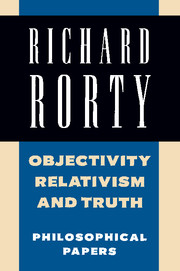Book contents
- Frontmatter
- Contents
- Acknowledgments
- Introduction: Antirepresentationalism, ethnocentrism, and liberalism
- Part I
- Part II
- PART III
- The priority of democracy to philosophy
- Postmodernist bourgeois liberalism
- On ethnocentrism: A reply to Clifford Geertz
- Cosmopolitanism without emancipation: A response to Jean-François Lyotard
- Index of names
Cosmopolitanism without emancipation: A response to Jean-François Lyotard
Published online by Cambridge University Press: 05 June 2012
- Frontmatter
- Contents
- Acknowledgments
- Introduction: Antirepresentationalism, ethnocentrism, and liberalism
- Part I
- Part II
- PART III
- The priority of democracy to philosophy
- Postmodernist bourgeois liberalism
- On ethnocentrism: A reply to Clifford Geertz
- Cosmopolitanism without emancipation: A response to Jean-François Lyotard
- Index of names
Summary
In the form John Dewey gave it, pragmatism is a philosophy tailored to the needs of political liberalism, a way of making political liberalism look good to persons with philosophical tastes. It provides a rationale for nonideological, compromising, reformist muddling-through (what Dewey called “experimentalism”). It claims that categorical distinctions of the sort philosophers typically invoke are useful only so long as they facilitate conversation about what we should do next. Such distinctions, Dewey says, should be blurred or erased as soon as they begin to hinder such conversation – to block the road of inquiry.
Dewey thinks that muddle, compromise, and blurry syntheses are usually less perilous, politically, than Cartesian clarity. That is one reason why his books are so often thought bland and boring. For he neither erects an exciting new binary opposition in terms of which to praise the good and damn the bad, nor does he distinguish between bad binary oppositions and some wonderful new form of discourse which will somehow avoid using any such oppositions. He just urges us to be on our guard against using intellectual tools which were useful in a certain sociocultural environment after that environment has changed, to be aware that we may have to invent new tools to cope with new situations.
Dewey spent half his time debunking the very idea of “human nature” and of “philosophical foundations” for social thought.
- Type
- Chapter
- Information
- Objectivity, Relativism, and TruthPhilosophical Papers, pp. 211 - 222Publisher: Cambridge University PressPrint publication year: 1990
- 5
- Cited by



